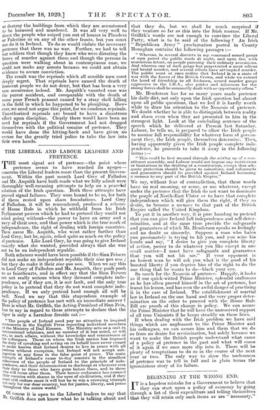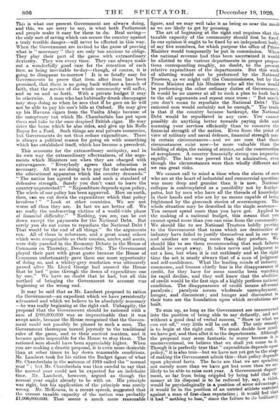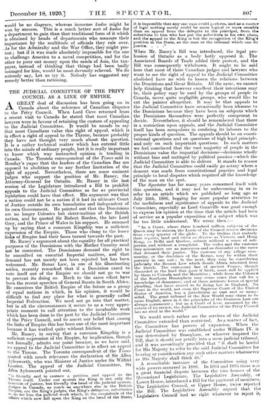BEGINNING AT THE WRONG END.
IT is a hopeless mistake for a Government to believe that they can start upon a policy of economy by going through a list of their expenditure and telling themselves that they will retain only such items as are " necessary."
This is what our present Government are always doing, and this, we are sorry to say, is what both Parliament and people make it easy for them to do. Real saving— the only sort of saving which can secure the country against a truly terrible danger—will never be effected in this way. When the Government are invited to the game of proving what is " necessary " they are only too anxious to oblige. They play their part of the game with extraordinary dexterity. They win every time. They can always make out a wonderfully good case for the retention of each item as being inevitable to-day—though, of course, it is going to disappear to-morrow ! It is so fatally easy for Governments to prove that item after item has been promised, that there is no going back without a breach of faith, that the service of the whole community will suffer, and so on and so forth. With a private budget it may be otherwise. A man who has habitually drunk champagne may stop doing so when he sees that if he goes on he will not be able to pay his son's bills at Oxford. He may give up his Havana cigars from. the Vuelta Abajo because of the sumptuary tax which Mr. Chamberlain has put upon them and take to the once despised British cigar. He may drive the horse which he also rides, and give up his Rolls Royce for a Ford. Such things are real private economies, but Governments do not thus reduce expenditure. There is always a political reason for going on with something which has established itself, which has become a precedent.
This accounts for the extraordinary antiquity, and in its own way the extraordinary effectualness, of the argu- ments which Ministers use when they are charged with extravagance. " Everybody agrees that education is necessary. All we are doing is to pay for the salaries and the educational apparatus which the country demands." " The nation has agreed to such and such a standard of defensive strength. Surely you don't want to leave the country unprotected I " " Expenditure depends upon policy. The whole of our policy has been approved. How on earth, then, can we cut down the expenditure which that policy involves ? " " Look at other countries. We are not worse off than they are. In fact we are better off. We are really the undeserving victims of a world-wide phase of financial difficulty." " Nothing, you see, can be cut down except the payments for the National Debt. But surely you do not mean to repudiate the National Debt ? That would be the end of all things." So the arguments run. All of them in substance, and a great many others which were recognizable as their cousins, uncles, and aunts, were duly paraded in the Economy Debate in the House of Commons on Thursday, December 9th. The Government played their part with great gusto because the House of Commons unfortunately gave them one more opportunity of doing so, and a whitey-grey resolution was ultimately passed after Mr. Lloyd George had assured the House that he had " gone through the items of expenditure one by one." We have no doubt that he had, but all this method of bringing the Government to account was beginning at the wrong end.
It may be said that as Mr. Lambert proposed to ration the Government—an expedient which we have persistently advocated and which we believe to be absolutely necessary —he was really beginning at the right end. Unhappily, the proposal that the Government should be rationed with a sum of f808,000,000 was so impracticable that it was swept aside, because the House recognized that the Govern- ment could not possibly be pinned to such a sum. The Government thereupon turned joyously to the traditional rules of the same, and to their ancient maxims, and it became quite impossible for the House to stop them. The rationed sum should have been appreciably higher. When you are making a drastic proposal, it is even more desirable than at other times to lay down reasonable conditions. Mr. Lambert took for his ration the Budget figure of what Mr. Chamberlain in the autumn of 1919 called the " normal year " ; but Mr. Chamberlain was then careful to say that the normal year could not be expected for an indefinite time. Mr. Lambert, however, argued as though the normal year ought already to be with us. His principle was right, but his application of the principle was surely wrong. Mr. McKenna, in a recent speech, suggested that the utmost taxable capacity of the nation was probably £1,000,000.000. That seems a much more reasonable
figure, and we may well take it as being as near the mark as we are likely to get by guessing. The art of beginning at the right end requires that the taxable capacity of the community should first be fixed. In our opinion it ought to be fixed by an independent body, of say five members, for which purpose the office of Prime Minister would temporarily be put in commission. When the national revenue had thus been ascertained it would be allotted to the various departments in proper propor- tions corresponding roughly, no doubt, to the present relative expenditure of the departments. But this work of allotting would not be performed by the National Trustees, as we might call the Commissioners, but by the Prime Minister an his Ministers who all the time would be performing the other ordinary duties of Government. It would be no answer at all to such a plan to hark back to the old arguments and repeat once more : " But surely you don't mean to repudiate the National Debt ! The rationed sum would certainly not be enough." The truth is that if the country became bankrupt, the National Debt would be repudiated in auy case. You cannot possibly do anything better towards paying debt and manning your services efficiently than to conserve the financial strength of the nation. Even from the point of view of military and naval defence, financial strength may in certain circumstances—and we are sure that those circumstances exist now—be more valuable than the building of ships, the raising of armies, and the construction of aeroplanes. A country financially strong can improvise rapidly. The late war proved that to admiration, even though the circumstances were then wholly different and we ran great risks.
We cannot call to mind a time when the alarm of men who are at the heart of industrial and commercial questions was more deep and genuine than it is now. National collapse is contemplated as a possibility not by feather- pates, but by men who have all the threads of knowledge in their hands and who are by no means capable of being frightened by the gimcrack stories of scaremongers. The whole situation may be described in the single sentence— You cannot spend more than you have got. Applied to the making of a national budget, this means that you cannot spend more than you can raise from the community. We should like to see National Trustees boldly proving to the Government that taxes which are destructive of industry have failed to justify themselves and in one way and another are costing more than they produce. We should like to see them recommending that such failures should be swept away. It takes nerve and judgment to cut a loss, but when it is cut ruthlessly and at the right time the act is nearly always that of a man of judgment and self-confidence. What the leading minds of industry, commerce, and finance chiefly fear is the disappearance of credit, for they have for some months been watching its rapid decline, and they well know that the abolition of credit would be the first sign of a highly perilous national condition. The disappearance of credit means all-round paralysis ; paralysis means wholesale unemployment, hunger, and discontent ; and hunger and discontent in their turn are the foundation upon which revolutions are built.
To sum up, as long as the Government are manoeuvred into the position of being able to say defiantly, and not without a good deal of verbal success, " Show us what we can cut off," very little will be cut off. The only remedy is to begin at the right end. We must decide how much we have got, and then allot it to the departments. Although the proposal may seem fantastic to many because it it unconventional, we believe that we shall yet come to it. Though it is perfectly true that " expenditure depends upon policy," it is also true—but we have not yet got to the stage of making the Government admit this—that policy depend., upon physical facts. The facts are that we are spending not merely more than we have got but more than we are likely to be able to raise next year. A Government depart- ment, so far from being crippled by being told that the money at its disposal is to be reduced by, say, a third, would be psychologically in a position of some advantage; it would be in the position of an untried athlete matched against a man of first-class reputation ; it would feel that, it had " nothing to loge," since the failure to do brilliantly
would be no disgrace, whereas immense kudos might be won by success. This is a much better sort of kudos for a department to gain than that traditional form of it which is obtained by heads of departments who measure their importance by the multitude of officials they rule over. . As for the Admiralty and the War Office, they might pro- test ; but if it was made absolutely impossible for the one to challenge America to a naval competition, and for the other to pour out money upon the sands of Asia, the tax- payer, instead of thinking that things had been badly managed for him, would be most devoutly relieved. We do seriously say, Let us try it. Nobody has suggested any remedy better than rationing.








































 Previous page
Previous page